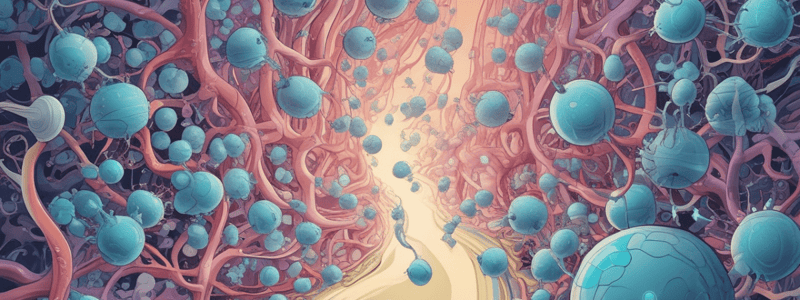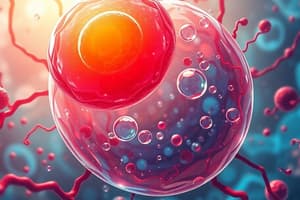Podcast
Questions and Answers
What is the estimated number of people with Alzheimer's disease in California?
What is the estimated number of people with Alzheimer's disease in California?
- 470,000 (correct)
- 150,000
- 35,000
- 1,000,000
What is the primary consideration in funding decisions for stem cell research?
What is the primary consideration in funding decisions for stem cell research?
- The availability of alternative treatments
- The age of the individuals affected
- The severity of the disease
- The number of people with the disease (correct)
What is the estimated percentage of adults with Type II diabetes in California?
What is the estimated percentage of adults with Type II diabetes in California?
- 5%
- 1%
- 20%
- 10% (correct)
What is the estimated number of people with Parkinson's disease in the US?
What is the estimated number of people with Parkinson's disease in the US?
What is the estimated percentage of Americans with mental disorders?
What is the estimated percentage of Americans with mental disorders?
What is the estimated number of cases of HIV in the US?
What is the estimated number of cases of HIV in the US?
In what year was the first test tube baby born?
In what year was the first test tube baby born?
What is the term for a baby conceived outside the human body and implanted in a uterus?
What is the term for a baby conceived outside the human body and implanted in a uterus?
What was completed in 2003?
What was completed in 2003?
What is the name of the first mammal to be cloned?
What is the name of the first mammal to be cloned?
How many frozen embryos are estimated to be in the US?
How many frozen embryos are estimated to be in the US?
What is a natural example of cloning?
What is a natural example of cloning?
What is the primary focus of bioethics?
What is the primary focus of bioethics?
Who should decide who receives a heart transplant?
Who should decide who receives a heart transplant?
What is the principle of beneficence in bioethics?
What is the principle of beneficence in bioethics?
What is the purpose of an Internal Review Board (IRB)?
What is the purpose of an Internal Review Board (IRB)?
What is the main goal of the President's Council on Bioethics?
What is the main goal of the President's Council on Bioethics?
What was the focus of President Bush's stem cell policy?
What was the focus of President Bush's stem cell policy?
What is the principle of nonmaleficence in bioethics?
What is the principle of nonmaleficence in bioethics?
What is the principle of justice in bioethics?
What is the principle of justice in bioethics?
Flashcards are hidden until you start studying
Study Notes
Stem Cells and Cloning
- Muscular dystrophy: likely to die by age 20
- Spinal cord injuries: paralyzed, but likely to live longer
Diseases Prioritized for Stem Cell Research
- Spinal cord injuries: 35,000 cases in CA
- Alzheimer's disease: 470,000 cases in CA
- Type II (adult) diabetes: 10% of adults (20 and up) have it
- Multiple sclerosis: 150 in 100,000 people have it in NorCal
- Type I (juvenile) diabetes: 1 in every 400-600 children/adolescents
- Heart disease: #1 cause of death in US (12% of adults)
- Cancer: #2 cause of death in US (7.4% of adults)
- Parkinson's disease: 500,000 cases in US
- Mental illness: 22% of Americans have mental disorders
- HIV/AIDS: about 1 million cases of HIV in US
Funding Decision Factors
- Number of people with the disease
- Groups that suffer from the disease
- Severity of the disease
- Disease mortality
- Average age at death
- Already available therapies or treatments
Current Bioethical Issues
- Stem cells (state, national, international)
- Genetically Engineered Organisms
- Knowing your genes
- Fertilization – choosing your child's genes and characteristics
- Environmental health
Timeline of Key Events
- 1973: Roe V. Wade – Unrestricted access to abortion
- 1978: First Test Tube baby born
- 1980s: Recombinant microorganism could be patented, lead is harmful to developing brain
- 1990s: Molecular biology, sequencing of human genome (other species), Jurassic Park
- 1996: Dolly the sheep is the first Mammal ever cloned
- 2000s: US stem cell research restricted
- 2003: Human Genome project complete
Human Cloning
- Identical twins are considered human clones
In Vitro Fertilization (IVF)
- Baby conceived in a test tube and implanted in a uterus
- Available since 1986
- About 100,000 IVF kids in the US
- Creates extra embryos, some of which could be used for stem cell research
- US: About 400,000 frozen embryos (unregulated)
- England: 52,000 frozen embryos (regulated by government)
Bioethics
- The study of the ethical and moral implications of new biological discoveries and biomedical advances
- Concerned with the ethics and philosophical implications of certain biological and medical procedures, technologies, and treatments
Basic Bioethics Principles
- Respect for people's rights: Autonomy, Dignity
- Beneficence: Benefits must be proportionate to risks
- Justice: Even distribution of benefits and risks throughout society
- Nonmaleficence: Do no harm, experiment must stop if causes harm
Decision-making Organizations
- Internal Review Boards (IRB's)
- President's Council on Bioethics
- Independent Citizens' Oversight Committee
Recent Stem Cell Policy
- President Bush Policy (2001): Applied only to federally-funded research, established President's Council on Bioethics
Studying That Suits You
Use AI to generate personalized quizzes and flashcards to suit your learning preferences.





